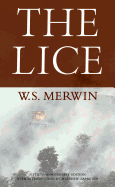
This 50th anniversary edition of W.S. Merwin's groundbreaking poetry collection The Lice introduces the poet's bold experimentation to a new generation of readers.
These poems are unrestrained by meter or rhyme. But while many poets who write in free verse adhere to some punctuation, Merwin abandons the comma and the full stop, creating heady juxtapositions through run-on sentences and enjambment. His lines flow in a moody stream-of-consciousness, taking shape both literally on the page and metaphorically, eddying around persistent themes. Like T.S. Eliot, Merwin mines antiquity for symbols. His imagery has an archaic feel. Here are moons, shadows, stones, hands and moths. But he repurposes these motifs in a modernist style to match his impressions of a dark, unaccountable, mid-20th-century world drifting toward annihilation. If The Lice is about anything, it's about the way death both eludes and rules the mind.
The best poems in the collection punctuate the poet's general dreaminess with stark, comparatively plain insights. "And once more I remember that the beginning/ Is broken," reads the terse "Whenever I Go There." In a single, unmoored line, it concludes, "Today belongs to few and tomorrow to no one." When Merwin's thoughts alight on the natural world outside the mind, away from the mythos of the self, the results are breathtaking. "The Widow," for example, opens with a beautifully humble image: "How easily the ripe grain/ Leaves the husk/ At the simple turning of the planet." The same poem produces one of the collection's most powerful lines: "Everything that does not need you is real."
The Lice is inquisitive, bleak and, at its best, profound. --Scott Neuffer, freelance journalist, poet and fiction author

